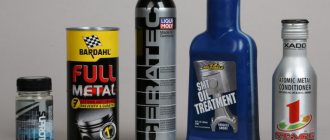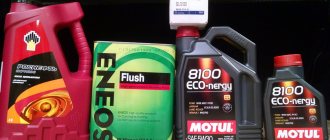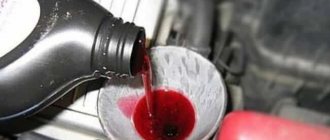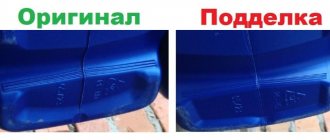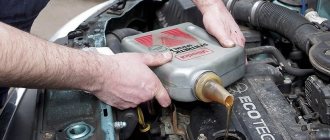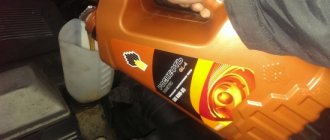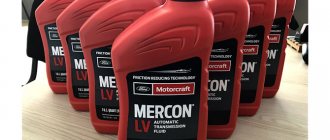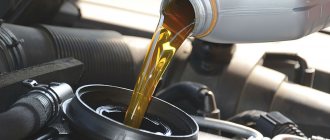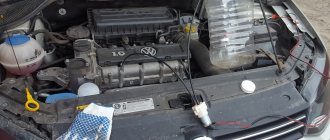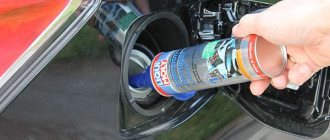Air intake system
Poor air filtration (due to untimely filter replacement) and leaks in the intake tract lead to contaminants entering the combustion chamber.
This causes serious abrasive wear of the cylinder-piston group - the working surfaces of the cylinders, pistons and rings. Because of this, excess oil remains on the cylinder walls, which then burns. Dirt is also deposited in the grooves of the piston rings.
There it combines with engine oil and turns into an abrasive paste. As a result, the moving rings, as they wear out, lose height, and the grooves expand, which leads to a decrease in the tightness of the cylinder and an increase in oil loss.
Engine additive rating
Choosing the best additive for your engine requires a responsible approach. Among the large assortment you can find products designed for different types of engines and their different conditions. By comparing the properties of the drugs declared by the manufacturer, as well as reviews of engine additives, you can identify the TOP best.
Applicants were considered according to the following criteria:
- Purpose by engine type, service life;
- Type of engine fuel used;
- Compound;
- Manufacturer's warranty;
- Consumption;
- Price.
From several dozen additives, the best drugs were selected based on a combination of indicators, as a result of which they were grouped by purpose and properties. The rating discusses in detail the advantages and disadvantages of each product.
Find out how to reduce oil consumption
Some effect can be achieved by using special oils containing special additives designed specifically to reduce product consumption. Switching to a more viscous oil also brings good results. If excessive flow is caused by worn valve guide seals, they should be replaced immediately. Then you will not need to overhaul the engine or install a new cylinder head.
The consumption caused by the leak can be easily eliminated by replacing the oil pan and the gas distribution mechanism. It is more difficult to install a new crankshaft oil seal - you will need to carry out quite complex disassembly work. Instead, you can try adding additives to the engine oil designed to swell rubber elements. Or purchase products that already have them.
Experts have not yet come up with a “magic” remedy that can eliminate high oil consumption once and for all. But this does not mean that this problem should not be paid attention to.
It needs to be resolved, and as quickly as possible. Moreover, in some cases, serious repairs are not necessary.
The effect of using the drug "Suprotek"
Many different drugs have been developed to improve the performance of such components and assemblies as the engine, rear and front axles, manual and automatic transmissions, injection pump, power steering, air conditioning, fuel system.
The Off-Road 4×4 gasoline additive helps gasoline power units installed on crossovers and SUVs operate more efficiently and silently. The additive does not change the chemical properties of motor oil, but due to special components it covers the rubbing parts of mechanisms with a protective layer and increases the service life of the internal combustion engine. The chemical agent “Diesel Off-Road 4×4” is specially developed for diesel engines also installed on off-road vehicles. The drug is used on crossovers and SUVs of any model; it makes the engine more durable under conditions of increased loads. All Suprotek compositions serving as additives interact with any brand of motor oil; exceeding the dosage does not cause side effects and does not interfere with the operation of the internal combustion engine.
Bardahl Full Metal
Bardahl Full Metal
For Russian cold conditions, this additive is considered one of the optimal ones. It is produced by a French manufacturer, and as a result of its use, a durable oily film appears on metal surfaces. The product provides good protection for the crankshaft and camshaft, creating powerful anti-wear properties. In addition to all this, engine oil consumption is reduced. This additive is very simple to use:
- add it to a warm engine;
- the dosage is calculated from the proportions of 400 ml per 6 liters;
- You can add the additive while operating the car.
The Bardahl Full Metall product is good for its cleaning properties. Special components clean the internal parts of the engine from deposits and carbon deposits, so you can fill it even in cars with the highest mileage.
Leak formation
Over time, the system loses its novelty, so it begins to leak in some places. This especially often happens due to valve stem seals. They lose their elasticity, which leads to leaks. It is worth immediately noting that such malfunctions must be eliminated through repairs. No additive will solve this problem.
Why are they then necessary? They are used for short-term effects. If you went on vacation or to another city and discovered a leak, it is usually not possible to fix it promptly. But this composition will help you reach the garage or service station. Regular use of such additives can adversely affect engine parts and disrupt its operation.
Bardahl Turbo Protect
Bardahl Turbo Protect
This additive is designed for turbocharged engines, and it is suitable for any of their modifications. Motorists buy this additive for:
- turbocharged diesel and gasoline units;
- for passenger and commercial vehicles;
- for sports cars.
The additive includes a good cleaning package, so the composition cleanses the insides of the engine well from dirt and carbon deposits. Due to the phosphorus and zinc content, this additive ensures the formation of a strong protective film between rubbing parts.
Causes and consequences of increased engine oil consumption
The main causes of oil consumption and possible consequences:
The wrong oil has been filled.
This is a fairly common problem. Often, not all motor fluid manufacturers indicate the exact viscosity of the oil, which is why car owners make a mistake and fill in a fluid that is not suitable for the car. In this case, flushing the engine and replacing the oil with one that suits the parameters will help correct the situation.
Wear of removable caps
Wear of the stuffing box valves occurs as a result of temperature changes or the use of unsuitable lubricant, which results in high oil consumption of up to 1 liter per 1000 km. Replacing these parts will help correct the situation.
Coking or wear of the slip rings
Coking of the rings occurs when low-quality motor oil is used, due to which their elasticity is lost and engine performance deteriorates. Wear of the rings leads to an increase in the gap between the piston walls and, as a result, the process of combustion of the oil fluid occurs.
Leaks
A common problem that can be easily detected during diagnosis. The leak could be through the crankshaft seals, cylinder gasket, valve cover, or through the oil filter.
Turbine malfunction
It should be noted that even a working turbine produces a certain amount of oil, and if it breaks down, the fluid consumption increases significantly. To check, you need to remove the pipe that leads to the turbine and see if there is oil in it. If liquid is detected, the compressor must be replaced to correct the problem.
Cylinder surface defect
If this problem occurs, it is worth changing the oil to one with a higher viscosity level. In advanced cases, you will have to completely replace the engine.
The best additives for diesel engines
For cars running on diesel fuel, additives are needed no less than for gasoline vehicles. This is especially true for cars that have been in operation for several years - a large amount of soot has already formed in their exhaust system, and fuel consumption has noticeably increased. Special additives allow you to optimize engine performance, improve fuel parameters and reduce fuel consumption.
LIQUI MOLY Diesel Flies-Fit K
The promise of reducing the pour point of winter fuel to -50 degrees on the can is, of course, good, but let's take a closer look. Since Liqui Moly antigel is a concentrate, the high price per liter is actually not that high: the instructions indicate that one measuring cap (25 ml) should be poured into 25 liters of fuel. Simply put, a liter can, when used according to the instructions, will allow you to “adjust” a thousand liters of fuel, increasing the price of each liter by a ruble and kopecks, which is not so much.
As for the pour point, you need to understand that for anti-gels this is more of a publicity stunt - the most important thing for us is the maximum filterability temperature, because what does it matter to us that the fuel has not yet frozen if the booster pump is no longer capable of pushing it through the filter? But here the technical documentation is much more modest, indicating that “depending on the quality of the diesel fuel, the filterability limit temperature improves by -10 °C.” In practice, we can talk about 6-7 degrees of gain for “average commercial” diesel fuel. Not so much? In fact, this is a good result for an antigel, especially taking into account the fact that the additive reduces the cetane number minimally - and often it is precisely this that antigels hit very sensitively, which, for example, for modern diesel engines with common rail, multi-component catalysts and particulate filters is already extremely undesirable. To protect against cold weather in the off-season on summer diesel fuel, Liqui Moly is enough. In addition, do not forget that the concentrate can be used at lower temperatures (from -25 to -35 degrees) and in a ratio of 1:500: more expensive, but more reliable. The additive quite clearly increases the lubricating properties of the fuel - and this is only beneficial for the high-pressure fuel pump or unit injectors.
Main advantages:
- Overall normal efficiency
- Low impact on cetane number
- Low price per liter of processed fuel
Minuses:
- No critical
Castrol TDA
Suitable for engines that run on diesel fuel. With its help, the corrosion process slows down and the negative impact of fuel components on fuel system parts is reduced. And this product, suitable for any season, will be most effective when used in winter. PROS:
- the ability to optimize the process of starting the power unit at any time of the year - although the effectiveness of the additive increases in winter;
- no effect on fuel viscosity and increase in its lubricating properties;
- reduction of noise and soot formation from a car engine.
Minuses:
- Less effective when using the additive in the warm season;
- As the dosage increases, the risk of rapid contamination of the fuel filter increases. To solve this problem, filter elements have to be changed several times more often.
ASTROhim Antigel
Our rating of the best diesel fuel additives ASTROhim Antigel continues. “Multiple test winner” (as proudly stated both on the packaging and on the manufacturer’s website) is available in a variety of packaging - from 300 ml bottles to 200 liter barrels. The most difficult thing to understand is the compact “passenger” packaging, since there are already three options: the same 300 ml can be designed for 30 liters of fuel (code AC-119), 60 liters (AC-120) and 120 liters (AS-121). As a result, if you are not careful, you can make a mistake, because in these three options the concentration of the concentrate itself (sorry for the tautology) is different.
In general, the composition is quite cheap - taking the same liter jar for comparison with Liqui Moly (devoid of a measuring cup and funnel, unlike the German competitor), we get an increase in the price of a liter of fuel at the specified concentration of approximately 97 kopecks: slightly less than that of Liqui Moly , but not critical. What about the characteristics? Well, the additive significantly reduces the pour point of the fuel, deteriorates the cetane number slightly... but the maximum filterability temperature does not decrease much, that is, we have more of a “defrost” of fuel than a full-fledged antigel, which should also prevent the crystallization of paraffin . As a result, overall, we will probably leave Astrokhim without first place this time.
Main advantages:
- Low price
- Low impact on cetane number
- Improving the lubricating properties of fuel
Minuses:
- Confusion with 300 ml packaging
- Inconvenient dosage
- Not the best reduction in filterability limit temperature
Hi-Gear Diesel Antigel
The American-made product provides improved diesel fuel performance without a noticeable increase in costs. By adding an additive to summer grades of fuel, you can increase their pour point to -27 degrees, and to -51 degrees for winter grades. The effectiveness of the product has been tested and confirmed by specialists from different countries, including Russian automotive experts. PROS:
- effective reduction of fuel filterability level and gelation temperature;
- safety during use - the dispersant additive does not lead to engine failure even under extreme engine operating conditions;
- affordable price compared to products of other brands - depending on the concentration, from 1 to 3 rubles are spent on processing 1 liter of fuel;
- absence of fakes on the market.
Minuses:
- The can's ill-conceived dosing system.
- There is a strong change in properties after the expiration date, so it is recommended to use the product only within the period specified by the manufacturer.
Increased oil consumption
Many car owners are faced with increased engine oil consumption. There may be several reasons for this:
- Using the wrong engine oil.
- Long-term downtime of the car, during which the working fluid has lost its properties.
- A breakdown that causes a leak.
- Aggressive driving style.
If the cause is not a malfunction, engine additives can be used to reduce oil consumption. It is worth noting that these products will only be truly effective in new engines or with relatively low mileage. In units with severe wear, no additives will help.
A special composition allows you to achieve reduced consumption; as a rule, it is a synthetic molybdenum-organic complex with microceramic particles. The additive creates a durable protective layer that is resistant to mechanical stress, fills microcracks, and also eliminates other defects. An anti-oil additive can also slightly reduce fuel consumption.
There is an oil additive for decoking oil scraper rings, the use of which is necessary to remove fuel combustion products. Of course, you can disassemble the motor and then carry out a thorough cleaning of all components, but if you do not have time for this, then such additives can be used for prevention.
An oil additive for decoking piston rings performs several tasks at once: it reduces engine oil consumption and can also increase compression. It is worth considering that such products only delay the need for full cleaning or repair.
Do additives help?
Before pouring an additive into the engine to reduce oil consumption, you need to find out whether it is effective or not. When pouring an additive into the engine, the car owner runs the risk of the product being useless. The condition of the engine is of great importance.
There are 3 types of technical condition of the internal combustion engine:
- New motor. Oil costs increase infrequently. It is possible to reduce the consumption of petroleum products through additives.
- Engine with high mileage. The compression in the crankcase is increased. It is necessary to use fuel/oil additives that reduce consumable costs.
- Severe wear. Signs of significant wear are loud knocking sounds in the crankshaft and increased oil consumption. Supplements will not be effective. The power unit needs to be overhauled/changed.
Composition of additives
Additives are intended to maintain the normal functioning of worn-out internal combustion engines. Their effectiveness depends on how correctly the instructions included with the purchased products are followed.
It is advisable to consult with a consultant in the store. For engines that are twenty to thirty percent worn out, additives are considered an excellent solution to a variety of problems.
There are motorists who are quite skeptical about additives that reduce lubrication costs. It must be remembered that certain additives not only reduce consumable consumption, but also flush the lubricant complex.
Let's sum it up
So, why does high oil consumption occur:
- Wear of sealing elements (seals, caps, gaskets).
- Problems in the aggregate part (rings, cylinders).
If your car begins to consume more oil, you should not ignore this sign. Yes, the engine will work with such malfunctions, but this already indicates its wear and tear or other problems. It is also important to control the oil level to avoid starvation and use a product of the desired viscosity. You can replace oil seals or gaskets yourself, but it is better to entrust work with rings and sleeves to specialists.
When should you not use supplements?
The engine additive helps increase the power of the internal combustion engine, improve dynamics, and make the engine quieter and more stable. But it is not permissible to use the product for all power units; it should not be used:
- on cars under warranty, on cars with engines after major overhauls that have not been run-in;
- for engines with serious malfunctions (smoking piston group, knocking crankshaft);
- on engines with a lot of dirt and soot in the oil system.
If the car is new and the warranty period has not yet expired, you should not add anything to the oil - “miracle” drugs will not increase the power of the internal combustion engine, but if any problems arise, the car can easily be removed from the warranty. When the engine smokes due to a worn piston, no “gadgets” will help it, but its “demise” may accelerate. If the engine has not been looked after, and there are a lot of dirt deposits inside it, the additive can “eat off” the dirt, and it will spread throughout the crankcase, this is also fraught with the “life” of the engine. In any case, you should use engine oil additives carefully; before performing such actions, you need to undergo diagnostics and check the condition of the engine.
How additives work
Modern developments in the chemical industry make it possible to use special impurities in additives, with the help of which the conditions for using individual parts and assemblies of a car engine can be significantly simplified. For example, some additives use so-called ultrafine diamonds for these purposes, which:
Protective coating on the surface of parts
However, claims about the listed properties are often just a marketing ploy taken to attract the attention of potential customers. Depending on the quality of the additive and its composition, in fact, the listed properties may have limited expression or not appear at all. This depends on the specific brand of additive for reducing oil waste, as well as the condition of the internal combustion engine (if its cylinder-piston group is literally broken, then it needs a major overhaul, and no additive will help it). Such an additive, which could be added when the engine eats up oil, should at a minimum contain substances capable of restoring the elasticity of “stiffened” oil seals and gaskets. Restore the mobility of the oil scraper rings by softening them, thereby preventing oil from entering the combustion chamber and reducing lubricant consumption. And only then include anti-friction and decoking components, which will reduce friction losses and improve fuel combustion by increasing compression.
Potential additive hazards
Despite the numerous positive effects of additives, many drivers have a negative attitude towards their use. This is completely justified. Motor oil manufacturers are large corporations that spend enormous amounts of money on research and production. Modern oils already contain a large package of various additives. They are able to effectively perform all the necessary functions (provided that the oil is of proper quality).
The additional additives used may conflict with the oil composition, resulting in low or no effectiveness of both compositions. If you use original oil from the manufacturer and change it in a timely manner, then the use of additives is not required. Their use is justified if the oil is already quite old or you bought a product of average quality that does not cope with any of the tasks, then additives can be used to “help”. It is strictly forbidden to use several additives at the same time.
If problems occur, repairs must be carried out. Supplements will only delay this procedure, but will not save you from damage.
Description of antifriction additives
Any motor oil in a car engine performs three functions - lubricates, cools and cleans the surfaces of rubbing parts. However, during the operation of the motor, it gradually loses its properties for natural reasons - due to operation at high temperatures and under pressure, as well as due to gradual clogging with small elements of debris or dirt. Therefore, fresh oil and oil that has been in the engine for, for example, three months are already two different compositions.
DETAILS: Changing the oil in an automatic transmission of an Audi A6 C5 Photo instructions on how to change the oil in an automatic transmission A6 C5
The new oil initially contains additives designed to perform the functions listed above. However, depending on their quality and durability, their lifespan can vary significantly. Accordingly, the oil loses its properties (although the oil can lose its properties for other reasons - due to an aggressive driving style, using the car in dirt and/or dusty conditions, poor oil quality, and so on).
These compounds are called variously - remetallizants, friction reducing additives or anti-friction additives. Manufacturers promise to use them to increase engine power, reduce friction of its moving parts, reduce fuel consumption, increase engine life, and reduce exhaust toxicity. Many remetallizing additives can also “heal” wear on the surfaces of parts.
| Product name | Description and features | Price as of summer 2021, rub |
| Bardahl Full Metal | Reduces fuel consumption by 3...7%, increases power. It has proven itself well even in difficult conditions. | 2300 |
| SMT2 | Increases engine efficiency, reduces engine noise, and saves fuel. | 2800 |
| Liqui Moly Ceratec | A good additive, recommended for any car. | 1900 |
| XADO 1 Stage Atomic Metal Conditioner | The effectiveness of the application is average. Slightly increases power and reduces fuel consumption. Very expensive for average quality. | 3400 |
| Mannol Molybdenum Additive | Efficiency is average or below average. Slightly increases power and reduces consumption. The big advantage is the low price. | 230 |
| Anti-friction metal conditioner ER | The air conditioner only works at high temperatures. There is an opinion that it contains chlorinated paraffin, which is harmful to the engine. | 2000 |
| Xenum VX300 | Inexpensive, but not very effective additive. Its use is unlikely to significantly increase engine power. | 950 |
| EngineTreatment | The use of this additive slightly increases engine efficiency. Can be used with various equipment. The main disadvantage is the high price. | 3400 |
The additives mentioned above include various chemical compounds. This could be molybdenum disulfide, microceramics, air conditioning elements, so-called fullerenes (a carbon compound that operates at the nanosphere level) and so on. Additives may also contain the following types of additives:
- polymer-containing;
- layered;
- metal cladding;
- friction geomodifiers;
- metal conditioners.
But you need to understand that such inscriptions on packages with additives are actually more of a marketing ploy, the purpose of which is to attract buyers. As practice shows, additives do not provide miraculous transformations, but they still have some positive effect, and in some cases it makes sense to use such an anti-wear agent.
Beware of additives that contain chlorinated paraffin. This product does not restore the surface of parts, but only thickens the oil! And this leads to clogging of the oil channels and excessive wear of the engine!
A few words about molybdenum disulfide. It is a popular anti-wear additive used in many automotive lubricants, such as CV joint lubricants. Another name is “friction modifier”. This composition is widely used, including by manufacturers of antifriction additives for motor oil.
There are also two disadvantages of using antifriction additives. The first is that in order to restore the working surface and maintain it in normal condition, the additive must be constantly present in the oil in the proper concentration.
As soon as its value drops, the work of the additive immediately stops, and in addition, this can lead to significant clogging of the oil system. The second disadvantage of using antifriction additives is that the rate of oil breakdown, although reduced, does not stop completely.
That is, hydrogen from the oil continues to flow into the metal. This means that hydrogen destruction of the metal takes place. However, it is worth noting that the benefits of using antifriction additives are still greater. Therefore, the decision on whether to use these compounds or not rests entirely with the car owner.
The method of using additives for the vast majority is identical. So, you need to pour the composition from a canister into the motor oil. In this case, it is important to observe the required volume (usually it is indicated in the instructions). Some formulations, for example, Suprotec Active Plus, need to be filled twice, in particular, at the beginning of the oil’s operation, and after driving about one thousand kilometers.
In general, we can say that the use of antifriction additives makes sense if they are meant to be added to inexpensive or medium-quality oil. This follows from the simple fact that the price of anti-friction additives is often high.
Therefore, in order to extend the life of the oil, you can buy, for example, inexpensive oil and some kind of additive. If you use high-quality motor oils, for example, Mobil or Shell Helix, then using additives with them hardly makes sense, they are already present there (although, as they say, you can’t spoil the porridge with oil).
Based on numerous reviews and tests from the Internet conducted by various car owners, a rating of anti-friction additives that are common among domestic motorists was compiled. The rating is not of a commercial or advertising nature, but only aims to provide the most objective information about the various products currently presented on the shelves of auto stores.
Determining the causes of increased lubrication consumption
In order to understand why the engine eats oil, it is necessary to study the nature and frequency of occurrences of alarming events and take into account additional factors that have appeared. This defect may be caused by the following reasons:
- Combustion of lubricant together with fuel caused by worn piston rings.
- Leakage through hardened gaskets and cracks in them.
- Penetration of lubricant into the cooling system through cylinder head gaskets that have lost their properties.
Why do motor oil costs increase?
First of all, it should be noted that increased lubricant consumption is not always considered a reason for a visit to the service center. Any engine needs oil fluid. Even in a normally running engine, the oil can be subject to overheating when operating at high speeds. Overheating of the engine oil in the engine causes it to penetrate the cylinder block and burn. Therefore, the very fact of increased lubricant consumption is not a sign of a vehicle malfunction. However, such a problem needs to be solved as quickly as possible. Otherwise, this will lead to many different problems that will end in engine failure.
Car oil can be highly consumed for three reasons:
- Incorrect choice of lubricant. If you choose an oil without taking into account its viscosity index and the additives present in the composition, this may adversely affect the functioning of the engine.
- Overflow. A fairly common reason for the engine to “eat” oil. To prevent problems, you must carefully refill the fuel tank.
- Prolonged idleness of the vehicle. If the car sits just like that, the consumables poured into it lose their own characteristics and cease to be effective.
In the last two cases, everything depends on external factors and the motorist. In the first case, the indicators of the petroleum product matter. If the lubricant is chosen incorrectly, it must be changed to another, more suitable one. This problem can be easily solved. But what to do if the internal combustion engine consumes a lot of lubricant due to overheating of the engine? Before you can fix the problem, you need to find out why it occurred. It is quite difficult to do this “by eye”. However, it is possible to detect certain signs that show the reason why the engine is “eating” oil. This will enable the motorist to prevent car breakdown in a timely manner.
One of these signs is considered to be bluish exhaust. They indicate that the engine is “eating” too much lubricant. Another sign is problems with spark plugs when starting the engine. This is due to a large amount of carbon deposits. If these signs clearly appear, you need to start troubleshooting.

